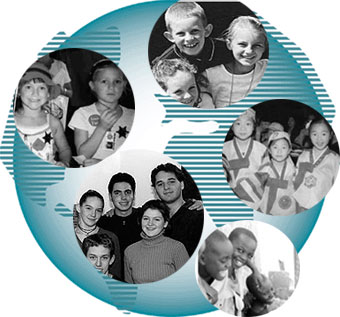Seeing Eye to Eye: Bringing International, National,
and Local Perspectives to Social Studies
Resources to globalize the curriculum of the social studies class are varied and widely available. From books to statistics to classroom guides, this page will provide a large number of resources that you can access for use in your classroom. 
Books, Book Shelves and Online Journals | Virtual Resources (including photos and sound) | Facts and Figures | Classroom Materials
Books, Book Shelves, and Online Journals
WorldCat – This resource is one of the largest catalogs in the world, containing over a billion items. You can search for the title or subject you are interested in and see if any libraries in your area own a copy. This is a public access interface but you can sign in to create your own account if there are items you would like to save or review.
I-Share – The University of Illinois Library belongs to a state-wide consortium of over 75 institutions whose collections are listed in the catalog. Whether your institution is a member or not, this catalog can be searched to discover items that might be of use. You can also use the drop-down list if you want to search the catalog of a specific institution.
Some examples of terms you might want to enter for a subject search:
- Globalization and Teaching
- Globalization – History
- Globalization – Juvenile Literature
- Globalization – Social Aspects
- International Education
- International Education – Activity Programs
- International Education – Case Studies
- International Education – Handbooks, Manuals, etc.
- Multicultural Education – Activity Programs
Libweb – This resource combines the online catalogs from libraries in over 146 countries. If you are looking for something from a particular region, you can specify.
ERIC – The U.S. Government supports the Educational Resources Information Center that can provide you with both ERIC documents and citations to the journals that ERIC indexes. This is one of the oldest and most useful databases in the field of education with a great deal of open source material.
DOAJ – The Directory of Open Access Journals is a great place to follow-up on your professional reading.
World Digital Library – A project of UNESCO, it includes digitized books, journals, manuscripts, maps, “motion pictures”, prints, photographs, and sound recordings. You can search by material type,place, time, topic, or institution.
Europeana – Although still in beta format, this resource will lead you to a wealth of materials from Europe’s libraries, archives, galleries, and museums.
Southeast Asia Digital Library – Links to videos, photographs, indexes, books, and manuscripts for the nations of Brunei, Cambodia, East Timor, Indonesia, Laos, Malaysia, Myanmar/Burma, Philippines, Singapore, Thailand, Viet Nam, and Southeast Asia. Brought to us by the Northern Illinois University’s Center for Southeast Asian Studies through a Department of Education TICFIA grant.
Virtual Manuscript Collection of Switzerland – The Medieval Institute of the University of Fribourg, Switzerland provides digitized manuscripts from over 380 manuscripts found in 16 different libraries.
Musée du Quai Branly – Digital access to one of the newest Parisian museums. The Musée du quai Branly highlights the arts of indigenous people of Africa, Oceana, Asia, and the Americas but be warned it is not easy to use.
Library of Congress Country Studies – According to the LOC, “The Country Studies Series presents a description and analysis of the historical setting and the social, economic, political, and national security systems and institutions of countries throughout the world.” It is a fantastic resource for detailed information and is associated with the LOC’s American Memory project.
Global Studies Custom Search – This is a Google coop tool that contains links to a large number of websites related to globalization and education.
Facts and Figures
Gapminder – One of the best resources ever for understanding the application of statistics to world development – not nearly as un-interesting as that sounds. Rosling uses great visuals to help us understand topics such as child health, climate, disasters, the economy, education, family, global trends, HIV, and poverty.
World Data Center – From Columbia University, this resource is primarily for access to a variety of datasets but the interactive mapper and map section might be very useful in the classroom.
World Bank – The World Bank has opened up access to its databank. This is particularly helpful for social studies students to understand the key development indicators from the organization.
World Factbook – Brought to us by the CIA, the Factbook provides a great deal of current information about the countries of the world including geography, language, and social and economic facts.
Classroom Materials
BBC Learning Zone Class Clips – Database of searchable clips from BBC News that may be very useful in the classroom.
Asian Educational Media Service
Center for Latin American and Caribbean Studies